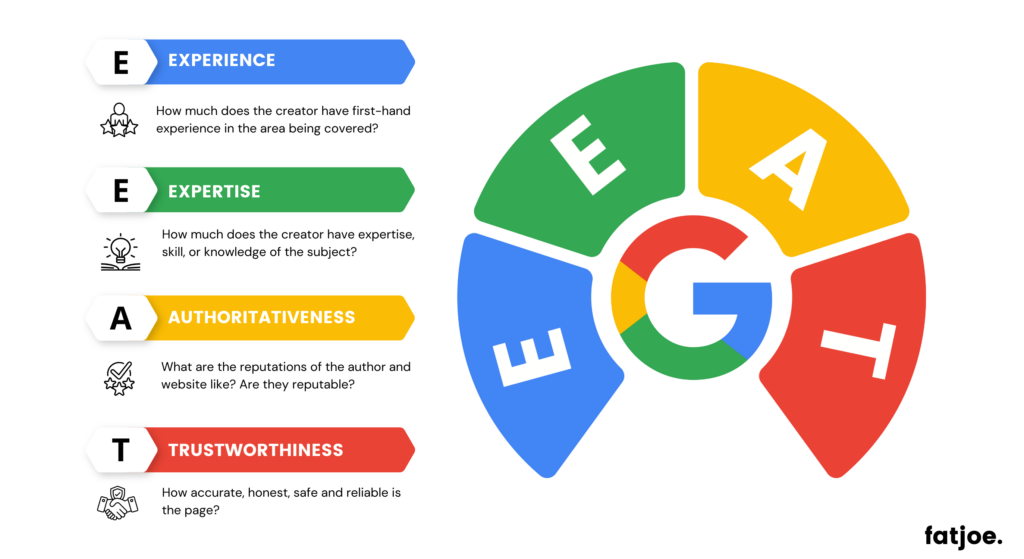
It’s 2025 and Google attempts to fend off the AI crap flood using its E-E-A-T principles.
Does covering the basics of the Google algo suffice though?
Is it enough to be popular? I don’t think so.
You have to go beyond the obligatory E-E-A-T framework! How?
Introducing the POPULAR framework!
In order to succeed in a social media driven online environment you need to rise above the noise level.
- website owners
- bloggers
- businesses
- publishers
have to take very specific steps. Luckily modern social SEO or in short SEO2 can help.
To assist you to create content that is popular with people I created my own POPULAR framework.
It goes way beyond the minimal requirements for helpful content Google expects.
Let’s take step back though. What is E-E-A-T and why do you need it?
What is E-E-A-T?

I’ve linked the E-E-A-T explanation by Google itself above.
Besides I refer to a whole guide on them further below.
Thus this is just a quick summary on what E-E-A-T means!
The E-E-A-T concept by Google is a means to educate human quality raters and people in general on what Google wants to see in websites.
The Google search algorithm then mimics those qualities and attempts to unearth those websites and content that match them.
Websites that exhibit the helpful content traits and appear to be written by Experienced Experts with Authority and Trust get on top of organic Google search results.
E – Experience
The first E stands for Experience. What does it mean?
It’s about the first hand experience. It’s the newest requirement. Why?
Google reacted to the growing flood of automated yet often mediocre or even flawed AI content.
This way they want to ensure that actual people who create content know first hand what to write about topics they cover.
E – Expertise
You also need E or Expertise to get on top of Google.
Ideally the authors of content have been dealing with topics they cover for a while.
To be an expert you usually need years. It depends on how much practice you have and how talented you are.
You can’t become an expert over night.
Thus new websites and authors are not treated as experts yet for obvious reasons.
Is the author known and respected in a given niche, industry or language? Do others refer to them as an expert?
A – Authority
The A is about authority or authoritativeness as in the cumbersome official Google wording.
Is the author a human being and has a track record of covering the topic at hand for a while?
Do they have proof that they are an authority? Do others refer to them, approve of them?
T – Trust
Trust (T) or trustworthiness is the the most fundamental of the traits someone has to exhibit be accepted by Google as a credible source.
There are experienced experts with lots of authority who nonetheless are not trustworthy.
Why? Some people simply
- lie or spread myths
- are way to controversial due to radical opinions
- or even provoke for the sake of notoriety (think The Real Donald).
Last but not least Google demotes humorist or satirical content for being fake. It gets the same treatment as fake news!
So to be trustworthy you also need a track record of telling the truth and being more or less objective.
Being too biased or opinionated backfires!
Then Google’s consensus algorithm gives you the “fringe voice” or “fake news” treatment in the worst case.
Are you popular on the Web? Like with people?
So the E-E-A-T basics above are common sense yet aren’t enough.
Almost everybody exhibits them by now. It’s the bare minimum to stay visible on Google!
In case you don’t you probably have been demoted for unhelpful content in 2023 or later.
Just because you are an experienced expert who is an authority and trusted does not mean you become popular automatically!
Yet there are ways to get there by extending your online presence approach!
These practical steps are based on a theoretical foundation with 7 main pillars.
These 7 pillars of SEO2 enable anybody to truly be part of the current Web!
This way you can succeed financially or in any other desired way.
The 7 pillars of SEO 2 needed to be POPULAR with people are:
- Presence
- Outreach
- Participation
- Usefulness
- Love
- Authority
- Recognition
Presence
Presence is more than Web presence as in the synonym for website. It’s online presence in a direct sense!
I’s the almost physical presence of appearing everywhere on the Internet where it matters for a particular
- person
- group
- brand
- business
Example:
- musicians had to be on SoundCloud a few years ago
- journalists needed to be on X/Twitter
- professionals have to join LinkedIn.
The mere presence on online communities is often required to be visible at all.
Yet you also have to present by presenting yourself regularly. You can’t just “set and forget”.
Outreach
Outreach means the active encouragement of bilateral communication between you and your audience.
Be it blogging, be it UGC (user generated content) or letting the community decide which Linux distribution should be used by Dell.
- You can send mass mailings to hundreds of “prospects” by mail.
- You can talk to strangers out of the blue and ask for favors right away.
- You can annoy people with dozens of automated follow ups!
Yet that’s not true outreach. Real outreach is about reaching out personally.
It’s about being and acting as an individual – especially when you represent a company.
Nobody becomes friends with a brand or a logo. They appreciate the actual individuals behind them.
Participation
Participation is about not only being there passively to be contacted like in “presence”.
It’s not only short term or low level communication efforts.
You have to truly participate to the benefit of all.
Genuine engagement is about taking part actively in communities on social sites on a ongoing basis.
Just dropping in and shouting about your latest content piece does not cut it.
It’s about being part of communities, building them up or setting up new ones in a larger context.
SEO2 experts do not try to infiltrate and spam social networks from outside.
They are an accepted part of them from day one.
Usefulness
Usefulness is the most important part of SEO2. It’s the pillar that is in the center of the holistic SEO2 approach.
Without actual value all of the other pillars are utterly useless.
In fact the created value is the foundation on which all of the other pillars reside.
Google calls it helpful yet I rather say useful as in having an actual use case. Merely distracting won’t cut it!
Value is an objectively as useful accepted piece of know-how transferred without payment to the online audience.
Only free access to content created by you or other types of value provided makes it valuable for the Internet community.
Free access ensures the acceptance by the online community. Value that is only accessible behind a paywall does not count.
When you give nothing for free people will not accept you!
Your presence among them in a casual non-commercial environment will be frowned opon or simpley ignored.
Join the party that social media inherently is and is perceived as by bringing a present or some food to share!
To sell something give something away.
This is the reason why Open Source solutions have such a success.
Nonetheless developers earn their fair share by support and services.
Love
Love is needed for SEO not only for link love! You need the passion!
And you need the sheer energy of being in love with what you do.
Many people still just perform their work mechanically. They don’t even like what they do. They work to pay the bills.
Yet you can’t do that in the creative industries. Only people who love what they do truly become creative.
Trust is a middle term goal. Based on usefulness and in accordance with the other pillars above you build trust.
A relationship based on the love of links is a good start. Passion is also carrying for the short term.
Yet over time true love can develop based on a link love affair, passion and trust!
Once you have created value people will come back once again to check whether you will do it twice.
When you provided value three or more times people will get accustomed to you and gain confidence in you.
In case you don’t disappoint them by trying to oversell in between you will gain trust over time.
They will learn to love your content after a while and return again and again.
When people love what they do it shows in their work no matter whether they get paid or not.
I love SEO and thus my blog here is always well take care of.
Authority
Authority is the long term goal you have to strive for when you want to succeed with your SEO2 efforts. Why?
Being useful and loved is not that difficult to achieve.
Gaining authority is an endeavor you need endurance for. It may take your whole life!
Just take a look at me! I blog about SEO since 2007 and I still feel like an impostor! Am I an authority?
To become an authority in your industry, on your subject or in your community you have to be useful and lovable by
- being present
- doing outreach
- participating
- being recognizable
over a long period of time. I talk about many years!
The question of authority is too complex to be described in a short paragraph on a list.
Let it be said that being useful and lovable are compulsory.
The other aspects mentioned are also needed.
Yet often they are not enough to achieve authority. Authority depends on how other people speak about you.
Do they even recognize you? Years of practice my not suffice when you stay a nobody!
Recognition
Recognition is based on stability, and recurring symbols like logos, avatars and names throughout different platforms and media.
I’m onreact everywhere since 2001 and use the same avatar and description no matter the site.
You can’t be apple on one site and orange on the next one.
As long as active participation is not recognizable it does not work.
An individual or company who has a positive record already on the other hand will be welcomed elsewhere on the web.
SEOs of the first generation were changing names and being viewed as attackers from outside.
SEO2 experts have an established and well respected online presence.
It can easily integrate into a new platform due to it’s existing online credentials.
Social media expert Tamar Weinberg is the best example for this.
As a well respected member ofmany online communities her sheer appearance on a new one ennobles it.
Recognition also means that others consider you to be helpful!
I’m delighted to say that the search community has recognized me on Search Engine Roundtable years ago!
Is this still Search Engine Optimization/SEO?
So you may wonder: are we still talking about SEO here?
Can it even be done at all? It sounds like quite a lot to do and achieve at once!
Yet by now even Google itself requires pretty much of it in its E-E-A-T concept.
Now most of you new to the still unknown concept of SEO2 will argue along the lines of
- This is not SEO anymore or what does that have to do with search?
- To achieve this you need a whole team of Internet experts working 24/7
These assumptions are understandable but not true.
The boundaries between search and social media or SEO and other marketing departments are long gone.
It’s the historical and still valid connection of content optimization in order to be found on Web.
That is the basis of the evolved SEO2 concept or popularization.
Yes, the content might not be on “your website” anymore!
The search may not be performed on a so called “search engine”. Yet the metaphor is still the same.
There is no need to come up with new cryptic acronyms each time the focus of the discipline changes.
Does this blog have all seven pillars?
Look at SEO2, the seo2.blog, the term or me as the source behind the SEO2 philosophy!
You will notice that at least 6 pillars out of 7 can be partly or wholly attributed to my work.
I maintain an active online presence via multiple channels. I do plenty of outreach on various platforms.
My participation on at least three international social media sites can be described as substantial.
There is no problem with recognition due to my
- name
- nickname
- avatar
and the attraction of the SEO2 concept itself.
The value aspect is not as easily achieved as the above.
Yet I strive to offer and promote the best and most useful information to enable my readers to succeed online.
I already see that some of these techniques have worked.
How do you know? Typical signs that people trust you are:
- a lot of subscribers and followers in your narrow niche
- other bloggers linking or referring to you
- overall acceptance of your shares and content on various social sites etc.
The 7 pillars of SEO 2 empower you to become POPULAR!
The 7 pillars of SEO 2 empower you to become popular online – and succeed even in a monetary sense.
I’m living proof. When you gain the authority described above you can even sell something without the need to advertise.
By then people will trust you as much that you won’t need any marketing at all.
I dislike the term in the first place. The Internet is not a market. That’s just a tiny part of it.
Stay with me to grasp the POPULAR concept. Content, freebies or free products are not popular per se.
It depends on how helpful they are. And indeed as of 2025 Google itself requires “helpful content”.
Are you already POPULAR or do you still have to improve your E-E-A-T to get visibility on Google?








